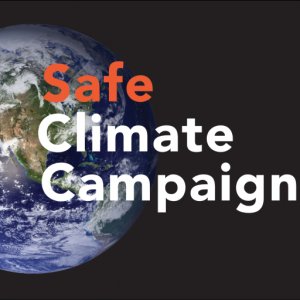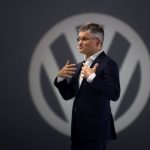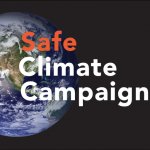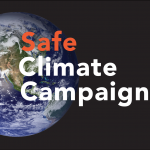Now Mr. Trump’s decision will slash….
By Dan Becker and James Gerstenzang, Safe Climate Campaign
September 18, 2019
President Trump’s attack on California’s long-established authority to set air pollution rules stronger than those of the federal government means we’ll see fewer clean cars and more pollution-spewing Trumpmobiles. We can almost hear the chant from the Oval Office: “Make America Polluted Again.”
Relying on a legal theory rejected by two federal courts, the administration claims, in effect, that California never had the authority to set its own standard — a standard that 13 other states have followed — in the first place. Never mind that the authority in question is a centerpiece of the 1970 federal Clean Air Act, and that presidents of both parties have allowed California to exercise its “waiver” more than 100 times to fight smog.
Read the commentary at latimes.com.
Opinion: Presidential debate must address auto pollution. The Detroit News.
July 25, 2019
By Dan Becker and James Gerstenzang
President Donald Trump is poised to eviscerate the clean-car rules that automakers negotiated with President Barack Obama. When they debate in Detroit, the Democratic presidential candidates must explain how they would repair the damage he is doing to the climate and undo the risk he is creating for the domestic auto industry.
Anything short of restoring the Obama plan and moving to more stringent mileage and emissions standards will leave the planet — and the Detroit 3 — in an increasingly precarious position.
There’s no better place to talk about auto pollution and the future of the industry than Detroit. The new fuel efficiency standard has long been seen as a job creator — as many as 20,000 by 2030 in Michigan alone, according to the Blue-Green Alliance. And automobiles are responsible for about 20% of the nation’s emissions of carbon dioxide, the primary global warming pollutant. Indeed, holding a debate in Detroit and not discussing auto pollution would be like debating in the Vatican and not talking about religion.
Read the commentary at detroitnews.com.
It’s up to California to save us from this Trump rollback. CNN.
January 19, 2019
By Dan Becker and James Gerstenzang
As President Donald Trump races to gut the Obama administration’s auto mileage and emissions program, the California Air Resources Board, an agency little known outside the state, could help protect us from the rollback.
The Obama plan, developed jointly with automakers and California officials, sought to make automobiles more fuel efficient and would deliver a fleet of new cars and trucks in 2025 averaging 36 mpg on the road. By almost doubling gas mileage and halving emissions of carbon dioxide, the primary global warming pollutant, the Obama standard is the biggest single step taken against climate change in history. And by prodding bailed-out automakers to build increasingly clean vehicles, it better positions the companies to compete with more-efficient imports.
Electric cars are a dumb target if Trump wants to hurt GM. The Los Angeles Times.
December 9, 2018.
By Dan Becker and James Gerstenzang
President Trump, looking for a way to strike back at GM for planning to mothball four U.S. factories that employ thousands of autoworkers, is threatening to take away a tax credit that has helped consumers buy electric vehicles.
“The U.S. saved General Motors, and this is the THANKS we get! We are now looking at cutting all @GM subsidies, including … for electric cars,” Trump said on Twitter right after the GM announcement. On Monday, economic advisor Lawrence Kudlow said the administration was looking to eliminate the electric car tax credit for all manufacturers.
If the president really wants to get GM’s attention, tax breaks for electric cars are the wrong target. GM is halting production (already tiny) of the plug-in hybrid Chevy Volt. The $7,500 tax credit’s availability to GM’s customers is about to expire. (It gets reduced, then phased out after a company has sold 200,000 of its electric models; GM has sold 193,000.) And deleting the tax break likely requires congressional approval because it was created by legislation.
Read the commentary at latimes.com.
Global warming fight faces major obstacles. USA Today.
November 28, 2018.
By Dan Becker and James Gerstenzang
Building a massive environmental organization to fight global warming — much as the National Rifle Association lobbies against gun control — is an intriguing idea. But no matter the size and funding, it would face obstacles:
- Big autos, big oil and big utilities, which pollute as part of business, lobby against environmental protections. Automakers devote vast sums of their roughly $14 billion marketing budget advertising gas-guzzling SUVs. The oil industry profits by fueling those trucks. And the coal industry enjoys a president who peddles fake news about coal’s rebirth.
- Much of the news media devote only episodic attention to the threats global warming poses, reporting on its most scary impacts, including hurricanes and wildfires, without connecting the dots to the climate.
Read the commentary at USAToday.com.
California must fight Trump on auto emission. Cal Matters.
October 16, 2018.
By Dan Becker and James Gerstenzang
President Donald Trump has slammed the brakes on the joint U.S.-California program to slash auto emissions and double gas mileage.
It’s up to Mary Nichols and the California Air Resources Board that she chairs to fight for the clean-car plan—the biggest single step any nation has taken against global warming.
The Trump rollback would halt gas mileage and emissions improvements. As a result, the fleet of new cars and trucks sold in 2025 would average just 29 miles per gallon in real-world driving, rather than 36 mpg, the equivalent of roughly 50 mpg in test conditions.
Nichols has said the state would “take whatever actions are needed to protect our people.”
Read the commentary at CalMatters.com.
The Myth That a Cleaner Car Is Less Safe Than a Dirty One. The New York Times.
August 2, 2018.
By Dan Becker and James Gerstenzang
To justify rolling back auto gas mileage and emissions rules, the Trump administration has fabricated a false conflict between safety and improved fuel economy. The administration is wrong. Americans must have both, and can.
Encouraged by automakers to roll back President Barack Obama’s stringent fuel-efficiency rules, the administration unveiled a proposal on Thursday doing just that. Its preferred option: bringing progress to a halt by requiring no further mileage improvements in new cars and light trucks beyond 2020.
As written, the original standard would cut tailpipe pollution in half and deliver a new-car fleet in 2025 averaging an estimated 36 miles per gallon in real-world driving, equivalent to about 50 m.p.g. in test conditions. It is the biggest single step any nation has taken to fight climate change. The Trump plan would lower that average to 29 m.p.g. on the road and spew an additional 2.2 billion tons of carbon dioxide, the key global warming pollutant, by 2040, according to estimates by the Union of Concerned Scientists.
Automakers are blowing smoke on mileage rules. The Los Angeles Times.
April 6, 2018
By Dan Becker and James Gerstenzang
President Trump and the auto industry are teaming up to roll back gas mileage and emissions rules that would deliver a new car fleet in 2025 averaging 36 mpg in real-world driving. Fortunately, California — and a dozen other states — insist we need to keep the tough standard, which is the biggest single step ever taken against climate change.
The Trump administration’s counter-arguments make as much sense as buying a pickup truck to haul your latte home from Starbucks.
California’s leadership role grows out of its historic smog problems. Under the 1970 Clean Air Act, it is allowed to set air pollution rules tighter than the federal government’s. Relying on that authority in 2002, the state adopted a law to reduce cars’ carbon dioxide emissions. Twelve states, mostly in the Northeast, followed California’s lead. Because automakers didn’t want to build cars under two sets of rules, they negotiated with the Obama administration in 2009 to set strong U.S. standards that California accepted.
Read the commentary at latimes.com.
The hypocrisy behind Ford’s ‘green’ reputation. Detroit Free Press.
March 30, 2018
By Dan Becker and James Gerstenzang
Bill Ford Jr., the executive chairman of Ford Motor Co., portrays his company as a leader in the fight against global warming. Earlier this year, he promised to deliver up to 40 electric and gas-electric hybrid models in four years. That sounds admirably green.
Unfortunately, what his company says and what it sells have been two different creatures.
In 2011, Ford Motor Co.’s then-CEO Alan Mulally signed a commitment promising that the company would not fight strong auto mileage-and-emissions rules it negotiated with the Obama administration, as did GM, FCA and Toyota, among others. Last August, acknowledging the global warming reality, Ford said his company would work with world leaders “in support of ambitious global greenhouse gas reduction targets. Now, Ford, its Detroit brethren and other major auto companies, are lobbying to roll back federal clean-car rules. And it looks like they’ll get what they want, with reports that the Trump administration is planning to reject the Obama administration’s fuel economy rules.
Read the commentary at freep.com.
We can fight climate change even under Trump and a polluter-run petrocracy. USA Today.
December 12, 2017
By Dan Becker and James Gerstenzang
Rather than shunning science and their constituents’ health as they do today, key Republicans once worked with Democrats to fight pollution. President Richard M. Nixon signed the Clean Air Act and other celebrated environmental laws that Congress passed unanimously. The gap between Congressional Democrats and Republicans on major environmental votes, now roughly 85 percentage points, was about 10 points in the early 1970s.
Then industry hijacked Republican thinking on the environment.
On the second anniversary of the Paris climate accord, the Trump administration’s refusal to seriously engage in last month’s global warming talks in Bonn — leaving the United States alone among nearly 200 nations — demonstrates how far out of line that kidnapping has left us diplomatically. A likely decision as early as this month to roll back a strong auto emissions standard demonstrates how it is playing out in the real world…
Read the commentary at usatoday.com.
Rolling back rules could backfire on automakers. The Detroit News.
August 2, 2017
By Dan Becker and James Gerstenzang
U.S. automakers are lobbying President Donald Trump and Congress to roll back rules that cut auto pollution and deliver better gas mileage, putting short-term profits ahead of long-term competitive interests. They’ve driven their gas hogs down this pot-holed road before. It led to their near-death experience less than a decade ago.
But Ford, General Motors and Fiat Chrysler are not just jeopardizing their industry and the environment. The weaker rules they seek will increase our oil dependence, give China’s burgeoning clean-car industry an advantage in the race to dominate the global auto market, and cost consumers billions at the pump. If they succeed, so much for Trump’s promises to cut the trade deficit, revive American manufacturing, and help middle-income workers.
When President Barack Obama worked with automakers and California officials to set us on course to a 2025 new-car fleet averaging better than 50 miles per gallon, the United States took the biggest single step of any nation to cut oil use and fight global warming. In January, after exhaustive analysis, the Environmental Protection Agency found that so much affordable gas-saving technology exists that….
Read the commentary at detroitnews.com.

No reverse gear. The Environmental Forum.
April-May, 2017
By Dan Becker and James Gerstenzang
On a sweltering day in the summer of 2011, President Obama unveiled auto mileage and emissions standards that, if properly enforced, will deliver a new car fleet in 2025 averaging 54.5 miles per gallon. Combined with his earlier clean-car rules, they are already making America more secure by shrinking its reliance on imported oil. The standards are protecting the economy by saving consumers billions at the gas pump and deeply cutting the petrodollars that flood the coffers of off-shore oil producers. And the Obama plan remains the biggest single step any nation has taken to fight global warming.
Fueled by anti9-regulatory fervor, the Trump administration–barely seven weeks in office–opened the door to weaker standards, with automakers lobbying for new and expanded loopholes. The industry is pushing for initial changes to lop 147o million barrels a year, or 10 percent, off the amount of oil the program would save. And it has launched an aggressive campaign to undercut the standards even further, threatening to use a rulemaking to unwind them. What’s more, it is eyeing the prospects of legislation to weaken the Clean Air Act and eliminate California’s….
Read the entire commentary at The Environmental Forum (password protected).

Dropping auto mileage rules would be a catastrophe. CNN.com.
March 14, 2017
By Dan Becker and James Gerstenzang
Egged on by the auto industry, President Trump is expected to start unraveling strong mileage and emissions rules that protect US energy security, consumers, the environment and even automakers’ healthy profits.
After lengthy negotiations with car makers, the Obama administration had set the standards in 2012. As written, the standards would phase in a new fleet of vehicles that would average more than 50 mpg in 2025. The average for the new-vehicle fleet today is only 36 mpg, but this does not take into consideration the credits that![]() automakers are awarded for in-vehicle technology that they claim reduces emissions of global warming pollution.
automakers are awarded for in-vehicle technology that they claim reduces emissions of global warming pollution.
With steady improvement in fuel efficiency, these standards would save consumers $4,000 at the pump over the life of their cars. That’s $1 trillion nationwide — and more if gas prices rise.
One week before Obama left office, the EPA completed an exhaustive analysis of the standards…
Read the entire commentary at CNN.com.

Climate change denialism is so last season. CNN.com.
November 3, 2016
By Dan Becker and James Gerstenzang
With climate change denial melting in the face of scientific reality, the 2016 campaign is likely to be the last in which the Republican Party can get away with nominating a presidential candidate who refuses to recognize global warming. In other words, now we can accelerate efforts to protect the climate.
The United States — responsible for more cumulative global warming pollution than any other nation — must do its part by wringing as much fossil fuel from the economy as possible. Tougher anti-pollution standards will accomplish this.
Such stringent rules require better technology and, under the Obama administration, are already slashing auto emissions. Hard-hitting standards can enhance energy efficiency and bring greater reliance on wind and solar power. They can require companies to clean up oil refineries, cement production and other heavily-polluting industrial operations.
It will be up to the next president to continue to enforce these standards. Hillary Clinton has…
Read the entire commentary at CNN.com.

Strengthen the rules against pollution. Miami Herald.
August 4, 2016
By James Gerstenzang and Dan Becker
Over the past eight years, strong mileage-and-emissions rules have improved auto efficiency by 5 miles per gallon, saving Americans money even after the cost of gas-saving technology is factored into car prices. Under the rules, the United States has cut oil use and reduced global warming pollution. Despite its fearful warnings that the standards would cost autoworkers jobs, the auto industry has added nearly 700,000 positions during this period, according to the U.S. Bureau of Labor Statistics. Now, taking advantage of technology, we need to strengthen the standards to protect consumers and the climate. A report issued last month by the Environmental Protection Agency and the National Highway Traffic Safety Administration documents two crucial…
Read the entire commentary at miamiherald.com.
Download

Strengthen fuel-efficiency standards. Pittsburgh Post-Gazette.
August 1, 2016
By Dan Becker and James Gerstenzang
Over the past eight years, strong mileage and emissions rules have improved auto efficiency by 5 miles per gallon, saving Americans money even after the cost of gas-saving technology is factored into car prices. Under the rules, the United States also has cut oil use and reduced global-warming pollution. Despite its fearful warnings that the standards would cost autoworkers’ jobs, the auto industry has added nearly 700,000 positions during this period, according to the U.S. Bureau of Labor Statistics. Now, taking advantage of technology, we need to strengthen the standards to protect![]() consumers and the climate. A report issued last month by the Environmental Protection Agency and the National Highway Traffic Safety Administration documents two crucial facts about the program, which is central to the Obama administration’s effort against climate change: The government’s cost estimates are on target — or may even have been too high — and there is ample technology on automakers’ shelves to meet the anti-pollution standards and go beyond them. But automakers have declared war on the rules. Their aggressive sales of pickups and SUVs forced….
consumers and the climate. A report issued last month by the Environmental Protection Agency and the National Highway Traffic Safety Administration documents two crucial facts about the program, which is central to the Obama administration’s effort against climate change: The government’s cost estimates are on target — or may even have been too high — and there is ample technology on automakers’ shelves to meet the anti-pollution standards and go beyond them. But automakers have declared war on the rules. Their aggressive sales of pickups and SUVs forced….
Read the entire commentary at post-gazette.com.
Download

Make an example out of Volkswagen. USA Today.

Kevin Hagen/AP
Volkswagen’s cheating on diesel emissions tests isn’t the first pollution scandal to rock the auto industry. Here’s how the Obama administration can make it the last. VW should be ordered to fix the diesels, or buy them back and scrap them, begin large-scale production of electric vehicles and face civil and criminal penalties, including a fine large enough that no automaker will even think about cheating on air pollution standards again. VW and government regulators suing the company are negotiating at a propitious moment, as federal agencies and the California Air Resources Board evaluate another crucial program protecting the environment — the joint U.S.-California 54.5 mpg mileage and emissions standard. It is possibly the biggest single step any nation has taken to fight global warming, and the automakers are fighting to weaken it. The VW scandal, and the separate revelation that VW may have also under-…

Truck sales boom as emissions push climate to the brink. Truthout.

Fabrizio Costantini/The New York Times
The auto industry spends roughly $15 billion on marketing annually, according to Kantar Media. Ads for gas-guzzlers are ubiquitous on the web, in print and on television. And sales of SUVs, minivans and other light trucks are surging — up nearly 10 percent in the first two months of 2016 compared with 2015, according to Automotive News. Coincidence? Probably not. Automakers don’t invest that kind of cash because they want to enrich the media. They do it because it sells cars — or, actually, mostly trucks. It’s worth considering as the auto industry whines that consumer demand for trucks will make it nearly impossible, if not impossible, to meet the tough fuel efficiency standards to which it agreed. In 2012, the Obama administration — with auto industry support — took the biggest single step of any nation against global warming and set us on the path to a fleetwide average of 54.5 miles per gallon. The climate doesn’t care about the…

Stalling on fuel efficiency. The New York Times.

Tim Lahan
The Obama administration’s stringent fuel efficiency standards are intended to reduce auto pollution and drive up gas mileage. They are the biggest single step any nation has taken to fight global warming. The rules worked well, at first. They no longer do. They can be fixed.The repairs are all the more important since the Supreme Court last month put a hold on the administration’s plan to limit pollution from coal-fired power plants.The fuel-economy standards are designed to deliver a new-car fleet averaging 54.5 m.p.g. in 2025. But this goal is in jeopardy as automakers increase the production of gas-guzzling light trucks, minivans and most S.U.V.s, which are subject to less stringent standards than other cars. These vehicles are driving up oil consumption and pollution and putting at risk American compliance with the Paris climate accord.Two recent government reports provide ample evidence that to cut carbon dioxide emissions, the…

How Obama can follow Paris climate deal: Column. USA Today.

Francois Guillot, AFP/Getty Images
President Obama’s crackdown on greenhouse gas emissions from cars and power plants made the U.S. a leader at the United Nations climate summit. Now, with the whole world watching, he can give real meaning to the promise Paris offers without bumping into an intractable Congress.The president can accelerate and expand efforts to slash emissions of global warming pollutants in the natural gas and oil industries’ drilling and distribution systems and improve refinery efficiency. He can issue tougher efficiency standards for energy-wasting home furnaces. And the government must begin to tackle industries such as cement manufacturing, which gets little public attention but spews vast tons of carbon dioxide, the gas primarily responsible for climate change.Such strong measures would have a multiplier effect: Not only would the U.S. cut global

German engineers only latest auto cheaters: Column. USA Today.

Nicht Gut! That device also defeated the public’s trust in the Volkswagen brand. Quartz.

Safety sacrificed in NHTSA revolving door: Column. USA Today.

Your Letters: Carbon dioxide storage. The New York Times.
Bailed-out GM needs to rev up emissions effort. The Los Angeles Times.

3 Lessons to Winning the War on Global Warming. InsideClimate News.
Next steps on climate change. Pittsburgh Post-Gazette.

American leadership beyond the climate summit: Column. USA Today.

Auto mileage reports should reflect reality: Column. USA Today.

Saving the climate by saving gas. Barron’s.

How loopholes could weaken CAFE standards. The Detroit News.

Why are the Big Three resisting new mileage and emissions standards? Los Angeles Times.

Climate deniers meet Joe Camel: Column. USA Today.

‘Green’ cars mostly hype. USA Today.

Millennials reject car culture. USA Today.

No good will come from Keystone pipeline. The Miami Herald.

Detroit should improve gas mileage. The Detroit News.

Clean-car battle shows how to fight for emissions reduction. Truthout.

Limiting carbon dioxide pollution by power plants. The New York Times.

Obama’s chance to change (political) climate. USAToday.com.

New Obama mileage rules will save gas and dollars. Huffington Post.

Detroit owes us better mileage. USA TODAY.

Energy savings pay for upgrades. Hearst News Service.

Drilling won’t lower gas prices, but this will. McClatchy-Tribune News Service.

U.S. investment in clean energy production is a must. U.S. News.

Darrell Issa’s push to abolish an antiquated Law. Huffington Post.

For Detroit, size matters. The Los Angeles Times.

Obama’s chance to reduce auto emissions and our thirst for oil. The New York Times.
Viewpoints: State should lead again on emission standards. The Sacramento Bee.

Obama can halt our oil addiction. POLITICO.

The best remedy for the price of gas. Los Angeles Times.

Fouling the Clean Air Act. The Sacramento Bee.

Cash for a clunker. Deseret News.

Tea Party Misses Target. The Huffington Post.

Build a better vehicle. The Miami Herald.

Set tougher mileage standards for vehicles. The Detroit Free Press.

BP Mess is a Mileage Argument. Bloomberg.com.

On climate, energy, oil Rigs: first, do no harm. Truthout.org.

Future cars, now. The Los Angeles Times.

OMB puts its thumb on the scale against the environment. Climate Progress.

It was big while it lasted. The Huffington Post.

General Motors needs more than jolt of Volts. The Huffington Post.

Obama on His Own. Truthout.org.

Use mandates, not markets, to push high-mileage cars. The Baltimore Sun.

With the stroke of his pen, the president can act against climate change right now. The Pittsburgh Post-Gazette.
Guest editorial: Standard will save car owners money

‘Cash for clunkers’ is a lemon–so let’s make lemonade. The San Francisco Chronicle.

Scientists warn that delay in cutting global warming pollution is dangerous. Politico.

Unfortunately the Energy-Climate bill has more holes than cheese. Politico.
Open Mic in The Arena. Politico.

California can lead the U.S. in kicking the gasoline habit

Cash-for-clunkers program crashes up against the environment. The Los Angeles Times.

Want tailfins with that? The Huffington Post.
Obama: Clearing the air in 100 days. The Huffington Post.

Obama’s power plays. The New York Times.
Detroit 3 must come clean on getting green. The Detroit News.

Obama’s Auto Pitch: Crush Those Clunkers. The Huffington Post.

Lessons learned from Exxon Valdez disaster. The Chicago Tribune.
GM, Chrysler don’t get it. The Los Angeles Times.

President Obama on global warming: Finally part of the solution. The Huffington Post.
Bush, blowing global warming decision, opens door for Obama. The Huffington Post.

The Brother-In-Law of all bailouts. The Huffington Post.



Opinion: We Can’t Let Up on the Pedal in the Drive for Electric Vehicles. Newsweek.
By Dan Becker and Maya Golden-Krasner
3/13/24
Following the hottest year on record, the fight for clean cars and a healthier planet is facing determined foes. Now it looks like the Biden administration may slow-roll the needed transition to clean vehicles, knuckling under to craven automakers, oil companies, and car dealers.
These powerful industries are teaming up…
Click Here to read the op-ed.
Opinion: A Setback for the Transition to Electric Vehicles.The New York Times.
By Dan Becker
2/20/24
It’s not surprising that Big Auto, Big Oil, car dealers and others have teamed up to run the Environmental Protection Agency’s draft auto pollution rules off the road. What is surprising and appalling is that after the hottest year on record and pledges to boldly confront the climate crisis, the Biden administration is bowing to their unseemly pressure.
The draft called for …
Click Here to read the op-ed.
Opinion: Successful auto strike shows path forward for workers, climate. The Detroit News.
By Dan Becker and Scott Hochberg
11/21/2023
The United Auto Workers is poised to finalize a key win for both workers’ rights and the environment. While wage and cost of living increases received the most public attention, the union also won an overlooked but groundbreaking victory: protections for electric vehicle battery workers.
It’s now up to President Biden …
Click here to read the op-ed.
Opinion: We have to get real and fix fossil-fuel vehicles, too. Newsweek.
By Dan Becker and Maya Golden-Krasner
7/21/2023
Electric cars alone won’t save us from climate change.
With heatwaves hammering people from California to Maine and around the globe, Vermont facing disastrous flooding, and massive wildfires cloaking the northern U.S. in smoke, President Biden was right to call climate change “the existential threat to humanity.”…
Click here to read the op-ed.
One decision can help get Biden’s climate goals back on track. The Hill.
By Dan Becker and Maya Golden-Krasner
4/7/2023
As President Biden feels the political heat for approving destructive oil drilling in the Alaskan Arctic and Gulf of Mexico, his climate goals — and his legacy — are in jeopardy. His best shot at getting back on track would be strong new auto pollution standards.
With these standards, a draft of which is expected next week, the U.S. could take the biggest single step of any nation to combat global warming…
Click here to read the op-ed.
To save money and the planet, Biden needs stronger clean car rules. Newsweek.
By Dan Becker and Maya Golden-Krasner
11/9/2022
The weeks leading up to this month’s COP27 Climate Summit in Egypt have laid bare the many challenges facing President Joe Biden, from OPEC-induced gas price volatility to damning reports showing that the planet is careening toward climate catastrophe.
But there’s a single step Biden can take to fight the climate crisis and save consumers at the pump: make cars cleaner, faster…
Click here to read the op-ed.
State’s wimpy plan to cut pollution needs muscle. CalMatters.
By Dan Becker and Scott Hochberg, Special to CalMatters
7/14/2022
Deadly fires, persistent drought, extreme floods and lost homes are part of the California Legislature’s stark forecast for the effects of climate change. And the U.S. Supreme Court has just hobbled the federal government’s ability to tackle climate pollution. That’s why it’s so frustrating that the California Air Resources Board is knuckling under to the auto industry with its weak plan for cutting tailpipe pollution, the state’s largest source of climate-heating greenhouse gases.
Gov. Gavin Newsom needs to step in before the plan is finalized next month and tell the board to strengthen the rule, speeding the all-electric transition and slashing auto pollution. The stakes couldn’t be higher…
Click here to read the op-ed.
Climate, politics demand Biden get tough on auto pollution. The Hill.
By Dan Becker, opinion contributor
12/24/21 09:30 AM EST
President Biden was right when he said global warming is an existential threat. That’s why it’s so disappointing that his administration produced auto-pollution rules that are a speed bump on the road to the climate precipice, right when we need a U-turn.
The new auto rules the Environmental Protection Agency (EPA) finalized Monday wrapped anemic pollution reductions with tinsel and bows for the auto industry in the form of loopholes and giveaways…
Read the commentary at thehill.com.
Download
Opinion: Biden’s new electric car goals are an Edsel masquerading as a Tesla. USA Today.
Dan Becker and James Gerstenzang | Opinion contributors
August 6, 2021 | Updated August 9, 2021
The United States needs to urgently slash global warming pollution with strictly enforced standards that phase out sales of new gasoline-engine cars and trucks by 2030 and dramatically boost fuel efficiency until then. But the emissions cuts in the auto plan President Joe Biden issued Thursday are too timid – and rely too heavily on automakers’ voluntary commitments to produce electric vehicles. They won’t cut it.
Indeed, the loophole-riddled Swiss cheese rules fail to surpass those that automakers agreed to nine years ago…
Read the commentary at usatoday.com.
Download
Opinion: Curbing climate change is auto mechanics, not rocket science. CNN.
By Dan Becker and James Gerstenzang
Read the commentary at cnn.com.
Download
Opinion: Trump Gave Automakers What They Wanted. Biden Shouldn’t.The New York Times.
By Daniel F. Becker and James Gerstenzang
July 7, 2021, 3:09 p.m. ET
As President Biden finalizes his road map to steer America toward a cleaner car fleet and safe climate, he should ignore the auto industry’s push for weak fuel efficiency and emissions rules and strengthen the tough standards imposed by the Obama administration that were shredded by Donald Trump.
Mr. Biden’s first step should be to direct the Environmental Protection Agency to reimpose emissions reductions as quickly as possible for new cars and S.U.V.s and other light trucks to 5 percent a year as called for under the Obama rules.
Then he should instruct the agency …
Read the commentary at nytimes.com.
Download
Opinion: Biden can, and should, do more to protect the planet. Washington Post.
By Dan Becker and James Gerstenzang
February 1, 2021
President Biden is restarting the fight to protect the climate. He has directed the federal government to buy only electric vehicles for its future fleet. He has frozen new oil and gas leasing on public lands and waters. And he’s pledging to restore the United States’ role at the center of the fight against climate change — first, by returning to the Paris climate agreement, and by committing to cut U.S. global-warming pollution to zero by 2050.
He also elevated environmental justice policies to protect low-income and minority populations from the pollution that has long fouled their communities. Where covid-19 and air pollution have collided, death rates have increased, particularly among people of color, who disproportionately live in smog-bound communities.
Following four years of the Trump administration’s near-total denial of global warming, we once again have a president who understands the urgency of doing something about the climate crisis.
But two important steps remain. The first involves….
A World Forever Changed. Hamilton College News.
By Dan Becker
July 24, 2020
COVID-19 is changing our environment and peoples’ attitudes toward it. We’ve learned that air pollution worsens the virus’ death rate, that people of color are at greater risk from the disease. We’ve confirmed that when we turn off polluting cars, factories, and power plants, air quality improves.
Science matters. Americans need to pay more attention to scientists’ warnings about climate change, just as many….
Read the commentary at Hamilton College News.
Download
Roll Back? Fight Back! CQ Researcher.
It was the ‘biggest single step’ against global warming. Trump gutted it.
By Dan Becker and James Gerstenzang
June 19, 2020
President Trump’s rollback of clean-car rules halts the biggest single step any nation has taken to cut global warming pollution. The rules took effect in 2012 and would deliver a new-car fleet in 2025 that averages 37 mpg, while cutting auto emissions in half. By trashing the rules, the president is leaving the world at fare greater risk of the climate catastrophes we are already witnessing.
Before Trump gutted them, the rules not only reduced pollution–they were saving Americans hundreds of billions of dollars at the pump. Even after paying for the gasoline-saving improvements–more-efficient transmissions and safe, lightweight materials–consumers could come out $4,000 to $6,000 ahead because their cars would need less fuel.
Each gallon of gasoline we burn pumps….
Read the commentary at CQ Researcher.
Download
Climate Progress Stalls Again, Thanks to Trump’s New Auto Rules. The New York Times.
He’s walking back a major effort to slow global warming.
By Daniel F. Becker and James Gerstenzang, Safe Climate Campaign
April 1, 2020
President Trump’s rollback on Tuesday of stringent automobile mileage and emissions standards torpedoes the biggest single step any nation has taken to fight the climate crisis. In dispensing with Obama-era rules in the name of imaginary regulatory reform, he will damage the health of the planet, our pocketbooks and even the very auto industry he things will benefit.
The Obama administration set the standards in 2012 to cut emissions and improve gas mileage roughly 5 percent a year from 2021 to 2025. Thirteen automakers agreed to them.